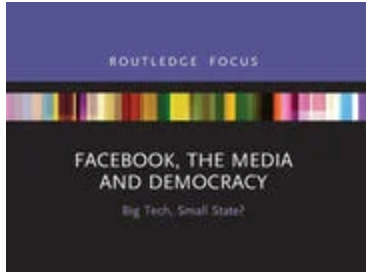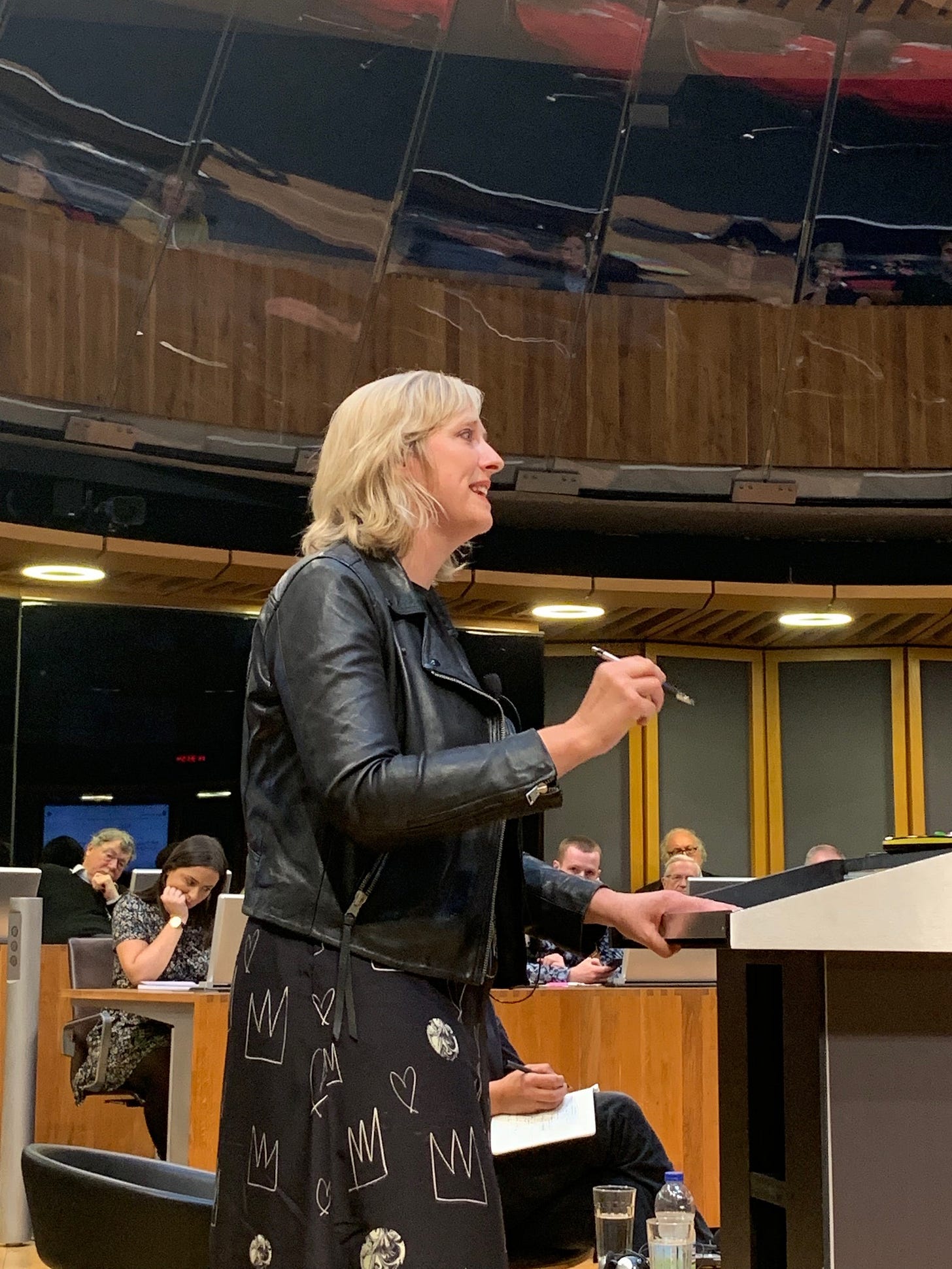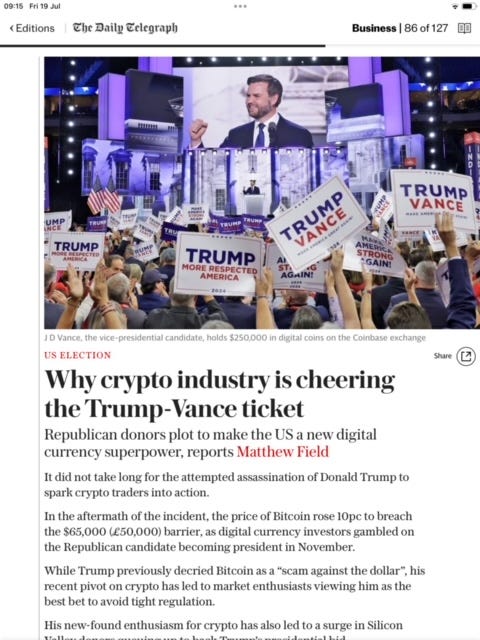A number of Big Tech entrepreneurs and investors have come out in support of Donald Trump in the run up to and during the Republican convention, as has been noted in a number of articles like this and this and this. Elon Musk is offering Trump $45 million a month and plenty of opportunities on Xitter.
Of course, not all of them have. Long-time Democrat Reid Hoffman, a serial tech entrepreneur and investor, remains committeed to the Democrats. So does Wales-born Mike Moritz, who told the Financial Times:
It’s a handful of west coast financiers doing what Wall Street bankers have long done — feathering their nests….They represent Silicon Valley about as much as the traditional Wall Street types represent the Bronx.
There is always a temptation to shoehorn all of Silicon Valley into one box. Once it was the Californian Ideology, which still has some resonance of truth, now it is an alliance of hyper-libertarian, accelerationist, eugenicist, transhumanist, bunker-building, rocket-launching worshippers of the Singularity. Well, there’s some truth in some of that, too. If you want to read up on the hippie West Coast roots of some of Silicon Valley, then this book by Franklin Foer and this one by Fred Turner are a good start. A more sophisticated academic analysis of Silicon Valley politics is here.
There is also a temptation to be simplistic about the interests of Capital. As Moritz says above, there’s a lot of naked self-interest in the shift by a significant tranche of Big Tech alumni. Unquestionably, West Coast capital has done extraordinarily well since the 1990s, including in the immediate aftermath of the 2008 Global Financial Crisis (GFC). Those with assets did well out of the GFC, underpinned by quantitative easing. The subsequent austerity and the continuing disparity of incomes and wealth helped sow the seeds of populism. Big Tech investors’ wealth also rose significantly after the pandemic, as the media and tech academic Dave Karpf pointed out here, to what he called ‘gravitational’ levels. In other words, some had strategic capital on a par with small countries. Now we see a significant section of Tech Capital leaping on board the authoritarian populist platform to protect and advance their own interests. (Karpf, interestingly, dates the notion of the ‘Tech Bro’, rather than the nerd, to about 2008, when Wall St started getting more excited about the potential of new tech companies. If you don’t subscribe to his Substack, then I recommend it).
In J.D.Vance, a number of writers have noted, Big Tech’s right-wing ‘got their guy’. He’s a former venture capitalist who lived briefly on the West Coast and has been funded by longtime Trump supporter and alumnus of the ‘Paypal Mafia’, Peter Thiel. (Many date the rise of super-wealth in Silicon Valley to the succesful launch of Paypal, whose backers, including Thiel, Hoffman and Musk, made substantial sums from its listing). Vance is a mate of George Osborne, who seems remarkably relaxed about his move from Trump critic to Trump fan, regardless of the authoritarian platform he has now joined. Just boys having fun, I guess. I prefer US Secretary of Transportation Pete Buttigieg’s take:
When I got to Harvard I found a lot of people like him who would say whatever they needed to to get ahead...I hope things work out a little bit better for JD Vance than they did for Mike Pence
Yesterday, Oberver journalist Carole Cadwalladr, who hails from close to Barry and has done so much to expose Big Tech and Russian disinformation over the last decade, coined the valuable phrase ‘Broligarchy’ to describe the pro-Trump Tech Bros. Here is Carole speaking in the Senedd in September 2019.
As she says of the Broligarchy:
As with their other obsession, crypto, the best time to have invested in Trump was 2016, and the second best time is today. We already have a word for what we’re watching now: it’s oligarchy. And we’ve already seen how this plays out. In Putin’s Russia, political and commercial interests are one and the same.
Thiel is betting – again – on the same phenomenon in America. Betting that he will be first among a new breed of tech bro oligarchs – a new super-class of broligarchs.
What appears to have turned some of these Big Tech Bros on to Trump is, surprise surprise, their growing hostility to the new regulatory and anti-trust, pro-competition agenda of the US regulators under Biden in recent years. An activist Federal Trade Commission under Lina Khan, and a Department of Justice determined to take on Big Tech monopolies, have clearly got under their skin. It wasn’t like that under Clinton-Gore or indeed Obama, they wail. And I doubt they think that if Kamala Harris is President she will rein any of that in.
Literally. Just watch this long discussion (90 minutes or so) between the founders of the Silicon Valley venture capital firm Andreessen Horovitz:
It’s interesting how personally they take criticism. Note their upset over some criticism of Mark and Priscilla Zuckerberg’s philanthropy. They want to be philanthropists, not tax-payers, as Anand Giridharadas points out. I called this ‘vanity capitalism’ in my book on Facebook, available here:
perhaps the endgame of vanity capitalism has been reached with the assertion that death can be prevented and life extended – for those who can afford it. Calico, the California Life Company, a product of Google Ventures, seeks to identify how to prolong life. Other start-ups exist with the same objective with investors including Big Tech billionaires. Silicon Valley’s imaginaries extend not only to life-preservation but to sea-steading – floating ocean cities with ‘political autonomy’, in other words outside the boundaries of normal government. Activities formerly undertaken by nation-states such as space exploration are now the purview of a privileged few billionaires such as Elon Musk or Jeff Bezos – Big Tech, Small State. The intellectual leader of the Paypal mafia, Peter Thiel, wants to challenge the boundaries of mortality. Vanity capitalism embraces all of the counterculture’s narcissism and self-indulgence.
Or, as Dave Karpf says:
If those entrepreneurs get rich enough, they’ll develop elaborate philosophical justifications for why the most important cause in the world is that everyone clap louder for them.
Feminist authors have been some of the strongest critics of the Tech Bro culture. I noted in my Facebook book:
Vanity capitalism is dependent on venture capitalists picking people who look like them. In her powerful, well-researched book Brotopia, Emily Chang identifies the Paypal Mafia as one of the many reasons Silicon Valley came to be run by young white men of affluence. In her book on the early years of Facebook, Kate Losse describes an early glimpse of Peter Thiel at a Facebook party. She suggests that venture capitalists tend to have ‘a predilection’ for younger versions of themselves. The counter-culture of course was a very male-dominated affair – and as Emily Chang demonstrates the philosophy of ‘let it all hang out’ now has a modern, more sinister embodiment in the entitlement attitude of some newly-wealthy Silicon Valley entrepreneurs. Feminist critiques of Silicon Valley point out that libertarianism is an ideology aimed precisely at privileged young men with no understanding of the ways in which the unpaid labour of women in raising children and holding together families has underpinned their opportunity. Susan Miller Okin says, ‘libertarianism in any form tacitly assumes…. a realm of private life in which the reproductive and nurturant needs of human beings are taken care of’.
Emily Chang has written about the ways in which women in Silicon Valley are discriminated against, objectified, sometimes humiliated and often patronised, harassed and on occasions assaulted. Kate Losse, Facebook employee number 51, recounts her memory of a company memo being sent round which said that all women members of staff should come to work on Zuckerberg’s birthday wearing t-shirts with his face on the front. She says the – largely male – engineers were valued more than staff in other positions. She said that ‘this boys’ world’ was ‘constructed on the reactionary model of an office from the 1950s. The male engineers were the visionaries and the nontechnical staff – often female, sometimes black, ‘were assumed to be duller, incapable of quick and intelligent thought’.
Feminist critiques of the Tech Bro culture and the behaviours it has provoked are widespread. And don’t let me get started on AI, which will be a subject for another day.
As it happens, J.D. Vance is apparently not a fan of Big Tech monopoly, unlike his patron Thiel, but let’s wait and see. He takes the view that Big Tech companies have reinforced American liberalism and clamped down on free speech, which is a common argument of the populist Right. He is, however, a fan of cryptocurrency. And so are Andreessen Horowitz, who claim to be defending ‘Little Tech’ - startups, not monopolists. Which would be fine, if one of them had not been a board member of one of those monopolists for well over a decade.
They have a view of the United States which says:
Our technology preeminence powers our economy and our military.
Our economic growth pays for our massive investment in technology and in our military.
And our military dominance keeps us safe from foreign threats and hostile ideologies that could crush our technology, our economy, and our people.
They have an explicit and unapologetic belief in the doctrine of permissionless innovation, which they say allows entrepreneurs to develop their ideas unchecked, rather than of the precautionary principle, which recognises the need for guardrails around leading-edge scientific developments. (I discuss permissionless innovation in my book on Facebook, whose slogan ‘Move Fast and Break Things’, explained in Mark Zuckerberg’s letter in the company’s filing for its Initial Public Offering in 2012, embodies this ethos). Andreessen and Horowitz argue that it is entrepreneurial innovation which powers the US economy and allows it to invest in the military. If you want to read an explanation and critique of the doctrine of permissionless innivation, here is a useful primer.
It is of course possible to argue this the other way around, as Mariana Mazzucato does, that US public/state investment in military technology paved the way for a range of innovations which enabled economic expansion in Silicon Valley, including, for example, the iPhone.
There is no question that the anti-Trust agenda under Biden has marked a significant departure from the progressive neoliberalism of Clinton-Gore and Obama, a description which works for the Democrats, but is not so useful in discussing New Labour in the same period. The privatisation of the Internet essentially happened in the Clinton-Gore years. One can certainly argue that it led to a wide variety of digital innovations, but it was a new world order constructed largely on the basis of US laws and principles, which also allowed private entrepreneours to develop technologies which broke laws and passed on the cost, through their negative externalities, to the public and the state (something for another post, another day).
Andreessen Horowitz have signed up to the Trump agenda, with all its authoritarianism, in order to protect their wealth and their wealth-seeking opportunities, including in cryptocurrency. It’s an accommodation too many on the Tech Right have been prepared to make. This is something of a contrast to early 2017, when Tech. Bros were campaigning against Trump’s travel ban on specific Muslim countries, as one of my teaching slides from 2017 records:
The economic historian Adam Tooze has just published a new chart on the huge increased spending by Big Tech companies on Data Centres.
Data Centres are critical to the rapid development of Artificial Intelligence, and to Cryptocurrency. They are also burning the planet. Big Tech’s use of electricity is racing ahead, again something I will return to another day.
Some argue that Silicon Valley support for Donald Trump is related to cryptocurrency: ‘a bitcoin play’. The theory, anti-Trump billionaire Mark Cuban says:
It makes it easier to operate a crypto business because of the inevitable, and required, changes at the SEC. What will drive the price of BTC is lower tax rates and tariffs, which if history is any guide (and it’s not always ), will be inflationary. Combine that with global uncertainty as to the geopolitical role of the USA, and the impact on the US Dollar as a reserve currency, and you can’t align the stars any better for a BTC price acceleration
Vance has been known to question the role of the dollar as the world’s reserve currency, by the way, as Simon Nixon notes here. Certainly Andreessen Horowitz want to be big in crypto. Crypto bros are coming out for Trump:
There is a different regulatory environment in the European Union, of course, where the crackdown on Big Tech is clearly having an impact and some companies are threatening to withdraw services. There are some who argue this means the world is ceding AI development to the USA. Again another subject for another day.
Tech Broligarchy support for Trump is about hostility to regulation, a desire to protect and enhance their assets, and to be allowed to move full-tilt into AI and cryptocurrency without impediment. Honestly, they say, you just don’t understand. It’ll make the world a better place. Just let us move fast and break things.
We’ve been there before. Marc Andreessen once wrote an essay entitled Why software is eating the world. Well, just last Friday, we saw what happened when software did eat the world. The consequences will last for a while.
I’ll be posting a bit more about technology and its regulation over future months, as it is a bit of an obsession of mine, I think the process of regulation is often understood; and I have a new chapter out on the subject soon!







